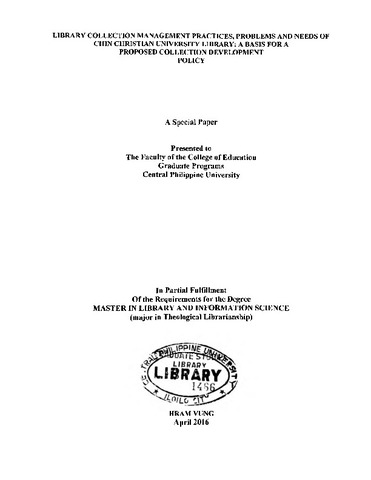Virtual reference assistant: Its implementation and utilization among academic libraries during the COVID-19 Pandemic
| dc.contributor.adviser | Cantel, Ana Mae B. | |
| dc.contributor.author | Bode, Jennifer B. | |
| dc.date.accessioned | 2025-02-13T07:52:20Z | |
| dc.date.available | 2025-02-13T07:52:20Z | |
| dc.date.issued | 2023-06 | |
| dc.identifier.citation | Bode, J. B. (2023). Virtual reference assistant: Its implementation and utilization among academic libraries during the COVID-19 Pandemic [Unpublished master's thesis]. Central Philippine University. | en_US |
| dc.identifier.uri | https://hdl.handle.net/20.500.12852/3129 | |
| dc.description | Abstract only | en_US |
| dc.description.abstract | This study was conducted to determine the implementation and utilization of the Virtual Reference Assistant (VRA) in 11 academic libraries of Iloilo during COVID-19 pandemic. A qualitative descriptive design was employed. To ensure validity of the results, triangulation was utilized. Participants were librarians, faculty and students of schools with VRA. Interviews were conducted to gather data which were interpreted through thematic analysis. Positive impact of VRA on students and faculty members is evident from the findings. VRA librarians, majority of which are females, have a degree in Master of Library and Information Science or a Doctor of Philosophy. The VRA serves as a valuable tool for reaching out and assisting patrons who cannot physically visit the library during the pandemic. It provides various services such as communication, addressing inquiries, meeting information needs, and offering quick instructions and ready-made answers to frequently asked questions. Learning and teaching experience for students and faculty are enhanced with easy access to information. Participants reported sufficient technical expertise to utilize VRA services, with support from librarians. Thus, there is a need for training to ensure effective utilization of VRA among library staff and users. In conclusion, findings underscore the significance of planning, diverse access, flexible implementation, and effective leadership to address challenges for successful VRA implementation. VRA serves as valuable resource for students and faculty to enhance access to information and support instruction. By considering these implications, the implementation and utilization of VRA can be optimized to meet the evolving needs of library users. | en_US |
| dc.format.extent | ix, 132 leaves | en_US |
| dc.language.iso | en_US | en_US |
| dc.subject.lcc | Z 669.7 .B63 2023 | en_US |
| dc.subject.lcsh | Electronic reference services (Libraries) | en_US |
| dc.subject.lcsh | Academic libraries | en_US |
| dc.subject.lcsh | COVID-19 Pandemic (2020-) | en_US |
| dc.subject.lcsh | Library users | en_US |
| dc.subject.lcsh | Reference services (Libraries) | en_US |
| dc.title | Virtual reference assistant: Its implementation and utilization among academic libraries during the COVID-19 Pandemic | en_US |
| dc.type | Thesis | en_US |
| dcterms.accessRights | Limited public access | en_US |
| dc.description.bibliographicalreferences | Includes bibliographical references | en_US |
| dc.contributor.chair | Dusaran, Reynaldo N. | |
| dc.contributor.committeemember | Valaquio, Belinda R. | |
| dc.contributor.committeemember | Quijano, Ma. Christina A. | |
| dc.contributor.committeemember | Delgado, Allana S. | |
| dc.contributor.committeemember | Acevedo, Christian George F. | |
| dc.contributor.department | School of Graduate Studies | en_US |
| dc.description.degree | Master of Library and Information Science | en_US |
| local.subject | Virtual Reference Assistant | en_US |





